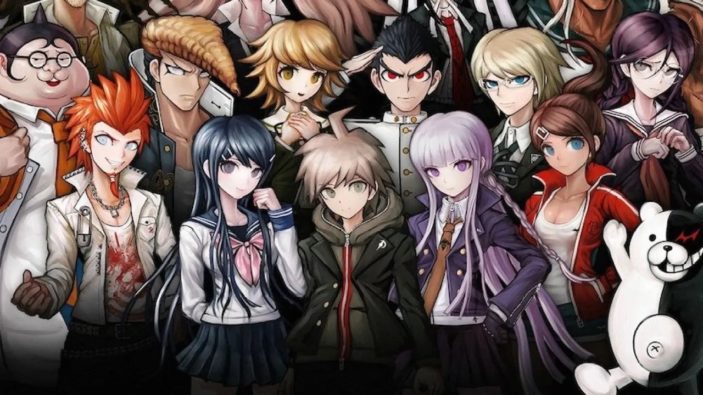
The last 18 months of life all over the world have been chaotic at best. The undeniable fact is that there’s never been a more opportune time to fall into the embrace of video games. But sheltering at home hasn’t just resulted in me playing more video games. I’m also immersing myself in gaming that is more narrative-driven. Enter Danganronpa, a video game series that has spawned several sequels and spin-offs, all supporting a shared universe. In light of the upcoming Danganronpa Decadence collection on the Switch at the end of 2021, I look back at the classics and how the series remains so relevant.
What is Danganronpa?
Unlike traditional games, Danganronpa doesn’t fit squarely into a specific genre. Mainline titles consist of a mix of action and visual novel-style gameplay with a smattering of shooter elements and mini-games. The premise revolves around Hope’s Peak Academy, an elite high school. Hope’s Peak only selects “Ultimate” students, each of them prodigies in their respective fields. The one exception to this rule is the “Ultimate Lucky Student” who is chosen by lottery. Sixteen of these students find themselves trapped by a mechanical bear named Monokuma, who forces them into killing each other in order to return home. Players spend a lot of time with these characters. Helping them explore their captivity brings them closer to the truth of how they ended up here, who Monokuma really is, and what awaits them outside of their prison.
Each chapter climaxes with a murder. The characters must investigate the crime, deduce the identity of the killer, and present their evidence to the class. This is where Danganronpa gets its unique name. The name Danganronpa is a portmanteau of the Japanese words dangan (弾丸, bullet) and ronpa (論破, refute). It refers to the core game mechanics during these class trials, as players shoot down arguments with ‘truth’ bullets. Later versions of the game added new abilities like shooting down chatter for time extensions or fortifying correct arguments with evidence.
A Case for Visual Novels
There aren’t many mainstream games brave enough to blend Ace Attorney with a Battle Royale-esque setting. As a genre in itself, visual novels aren’t very common in the West. For the everyday player who uses gaming as a way to relax, reading walls and walls of text is certainly an acquired taste. But if you are someone who is genuinely invested in games with plot and character development, Danganronpa is unmatched. Interacting with the cast through talking and giving gifts showcases a kind of immersive, participatory style that isn’t possible in other mediums. Choices have consequences and reflect how you build relationships in the game. Danganronpa 2: Goodbye Despair even takes this a step further, with voice acting during key moments adding depth to the characters.
Hope vs Despair
Each Danganronpa game has its own plot and characters, allowing it to explore a multitude of themes. However, the overarching theme is always one of hope versus despair. Without giving anything away, the name “Hopes Peak Academy” is crucial. Its students represent humanity’s hope. Running them through these killing games is an exercise in psychological torture. What happens when the absolute best of us are thrown into the deepest, darkest abyss? Social issues including gender, sexuality, and identity are prevalent in each game, but perhaps more so in later ones. A particular shout out to Ultra Despair Girls, and the abject horror of the moment the villain’s motivations finally crystallise.
Kawaii, Pink Blood
Despite these dark themes, Danganronpa dresses approachably with a distinct ‘anime-style’ to its characters. But like every other aspect of the game, nothing is quite as it seems on the surface. Monokuma himself and all of the other sequels’ mascots are also cute with their plushie exteriors but this is juxtaposed against creepy and psychotic personalities. The chapters get incredibly dark with each new murder but the game lightens itself up through colouring the blood in pink and having fantastical execution scenes that are wild enough that you almost forget that a character is being tortured. Overall, it’s kitsch and fantastical elements that remind one of the pulp fiction genre.
What started off as an initial game about high school students trapped in school has evolved into a much larger storyline. To tell this tale, Danganronpa has branched out into light novels, manga, soundtrack albums, a sound-based visual novel and even a theatrical play. The lore itself while imperfect is wacky, insightful and makes just enough sense for me to stay hooked. Danganronpa is a unique entry, into the visual novel genre, paving the way for visual novels to be embraced globally. And that is the irrefutable bullet.
Danganronpa Decadence Collection launches December 3, 2021 on Nintendo Switch.
